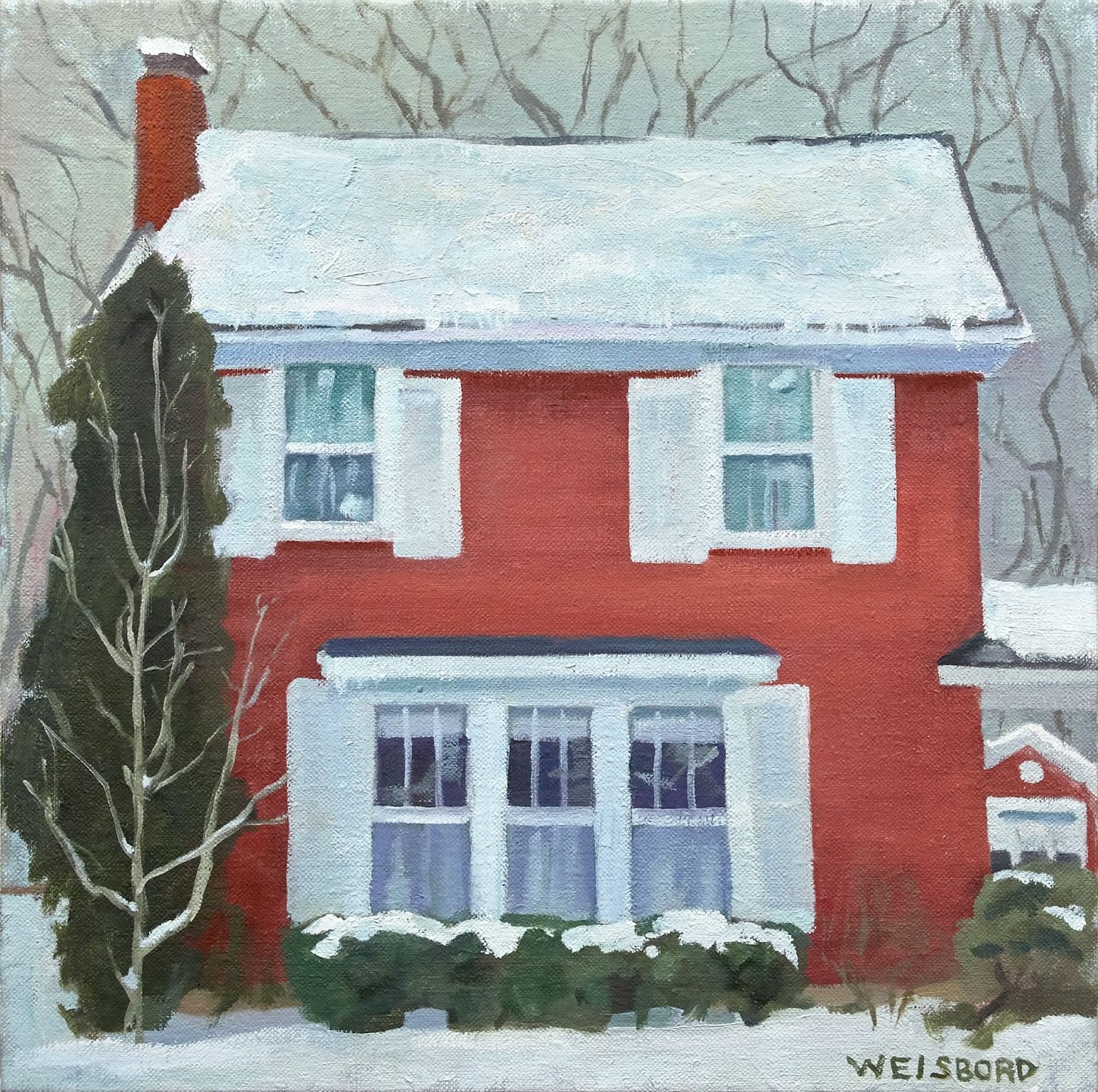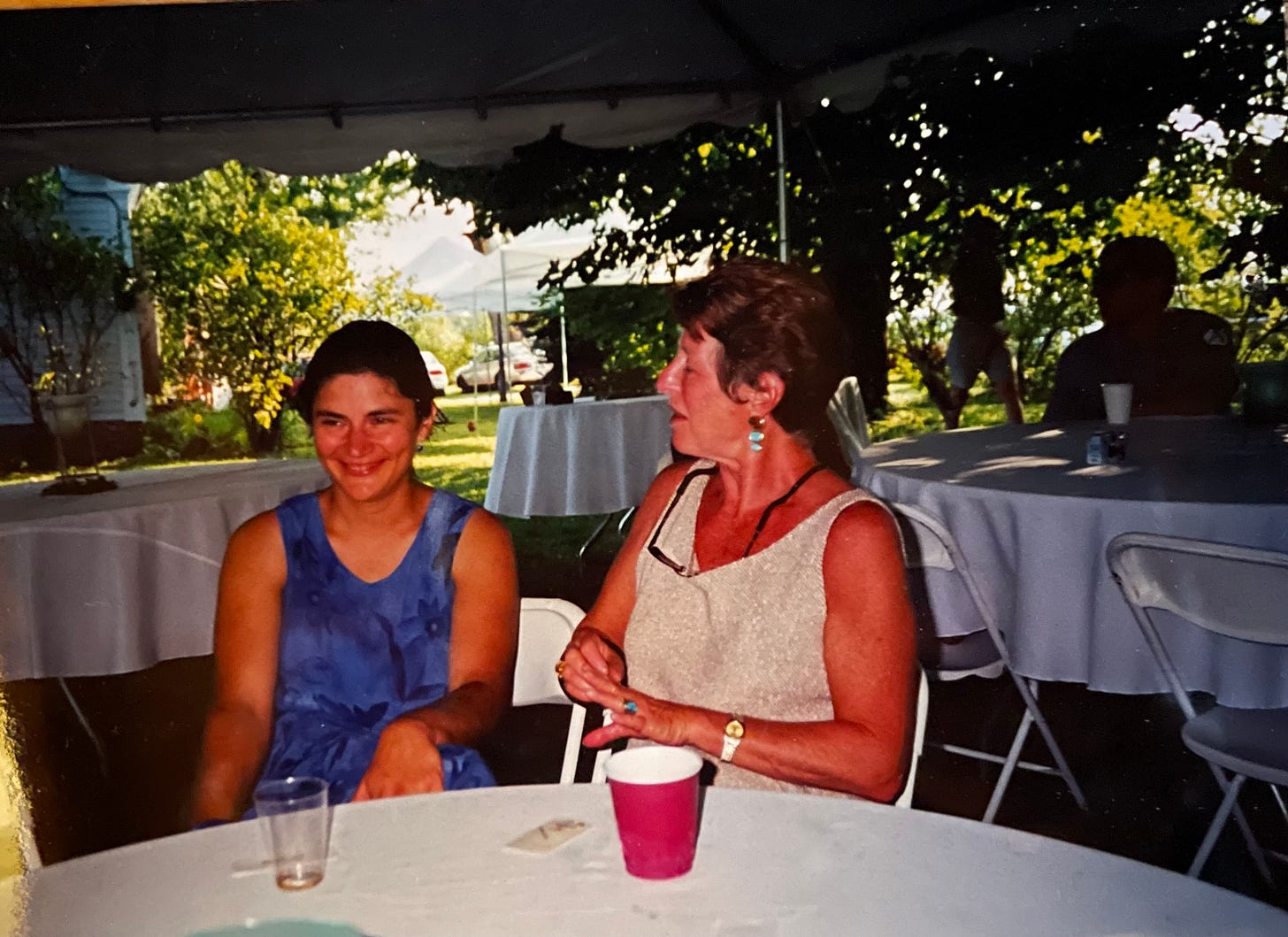Two Houses. Two Painters. Two Parents. is a newsletter of stories about art, feminism, grief, and time excavated from the Soho loft where I grew up. Posts are free and illustrated with the work of my long-divorced parents, the painters Mimi Weisbord and Lennart Anderson.
10/04/2024
My mother’s loft in Manhattan had a scent I could trace because I knew so much about her. I knew its must from books and rugs, from the Chinese herbs that she stored dried in jars.
Mary Jane’s house is a brick Vermont village farmhouse also filled with books, rugs, antique furniture, plus a Hearthstone in one corner, but there is something more. Perfume? Eucalyptus? I don’t know. Mary Jane was not my mother.
She did once call me and identify herself as my “academic mother,” which was touching, though I was then still young enough to be embarrassed by my obvious need for an academic mother (and not just a mentor).
Her house is now filling with people.
Mary Jane died last night.

I learned this while assembling baking ingredients as part of a plan to visit her today. I knew she was likely no longer eating much, but my routine had been to call and see if she’d like another “banana bread visit.”
She’d answer, “Yes, I would like another banana bread visit.”
The friend caring for her this week, also once my English professor, is still in the house with the scent of books and eucalyptus. When she called, I thought it was about my visit; we’d discussed the need to play it by ear. Then I heard the steadiness in her voice, and I knew my visit might not be possible, and in the next instance came the futility of bargaining.
Death, in her long dark robe, had selfishly squirreled Mary Jane away, tired of waiting her turn at the door as I used to wait during office hours in the Old Mill, where she’d listen to students in a way graced with love.
Mary Jane was the first to respond to my work as though I were a writer, to my earliest efforts to put my parents on paper, an act of respect that was, for me, life-changing. The people who bring us to our craft are holy.
I wade among people who feel that way about my father, that he was their most important mentor, painter, and generous teacher. And now I feel that loss with them. Because losing a parent is different. Losing a parent can welcome complicated grief and a turn toward a vast unknown territory where we must learn to live. When my father died, the house in Brooklyn filled with grievers who’d lost the center of their art world. I was grieving differently. I’ll stay put today.
And think of my mother greeting Mary Jane in the afterlife. She’d be patiently waiting her turn, a long wait. But Mimi had great tenacity, and she adored Mary Jane. She would visit Kim and me in Vermont and ask, “Will we be seeing Mary Jane while I’m here?” And admonish me to put out cookies. I imagine my mother has cookies and tea ready on the other side.
I gave this painting to Mary Jane a few years ago when I reentered her life with a memoir to share that I’d begun under her wing over 30 years before. I knew it was perfect for her house, full of many of the same books as my mother’s; I knew my mother was pleased to have it hanging there.
On that visit to her red brick village farmhouse, Mary Jane loaned me Alexander Nemerov’s biography of Helen Frankenthaler (Nemerov, another whom she’d mentored). She sat beside me, grasped my hand, and told me she loved me.
On another visit, she smiled from her hospital bed when I entered her den, “You are so beautiful,” she greeted me. And a few weeks ago, while I was sharing anguished plans for a piece about a strange painting by my father, she smiled behind her oxygen tubing and said simply, “I’m so proud of you.”
We were on her enclosed patio with the afternoon light. There were pots upon pots of flowers behind her. She’d plant hundreds of bulbs each fall. She had a beautiful vegetable garden, too.
She loved watching things grow.
I don’t know if I’ll return to her house that, as with my mother’s, seemed to embody its occupant. Maybe if there is a reception there after a memorial service, but how would that be managed? I imagine hundreds will mourn. She was an accomplished professor who’d started as a spousal hire in an era of academia now long over; she identified with every student who didn’t fit in and made them welcome. A feminist from the South, she was quietly fierce and soared with the eagles, demonstrating the dignity of following her own finely tuned compass. She was a poet and a Faulkner scholar, and like the scent in her house, other things I do not know, her life and career held so many chapters.
I’m the age she was when she had me as her student. But I felt I was again in my 20s when we were together. She said she saw me that way, too. It was not insulting. I told her that she didn’t look so very different when we reconnected. She responded that she was very much different.
As with my father's grievers, stunned to learn he’d passed on another October morning, I was reluctant to believe her.
“Division and Remainder”
by Mary Jane Dickerson (reproduced with permission from her daughter)
The large maple closest to the house
has long etched its odd twig patterns
on the brittle cold panes of our bedroom window.
Now, the tree expert insists it must come down.
His voice drones on about its rot,
its threat to the house in a high wind,
and his wide gestures spread the blame
over years of road salt, exhaust fumes,
the tree’s great age.
Soon that sugar maple lies about the grass
while chain saws swarm over its parts
like a colony of black ants
dismembering a golden butterfly
until the tree becomes
what we can load,
carry and stack,
then measure by cords,
our only way of coping
with the diminished
design of things..
Mary Jane Dickerson was a founder of SunDog Poetry, a 501(c)3 with a mission to promote poetry, support Vermont poets, and poetry programming for Vermont audiences of all ages. A native of North Carolina, she taught literature and writing at the University of Vermont for over 30 years.
“Division and Remainder” first appeared in Common Woman, Summer 1978, and is in her first volume of poetry, Tapping the Center of Things, The Tamarac Press, 2013.





Eliza, I'm so sad for you that Mary Jane is gone from your life, but clearly you've preserved so much of her in your writing. I can't imagine how grateful she must have felt to have you close by to visit with her and share your discoveries as you delved deeper into writing since you're parents have died, and also to have the connection with your mother in person and through her painting. I met her once at an odd party and when she talked about you her eyes lit up and her whole face lifted. She was so proud of you, like the flowers she'd grown to surround her with beauty and grace. Your writing is stellar.
Eliza, I know the ache and the gratitude you evoke here. Beautifully done. I am sprry for the loss of your irreplaceable mentor.